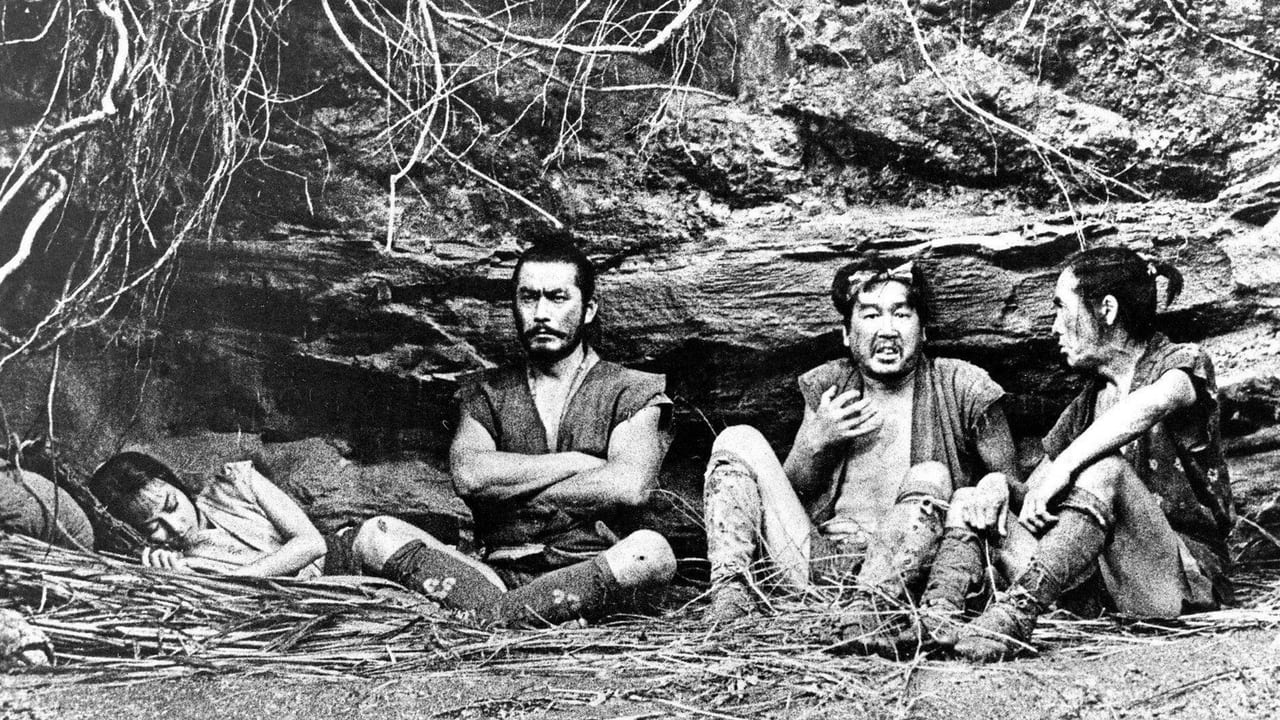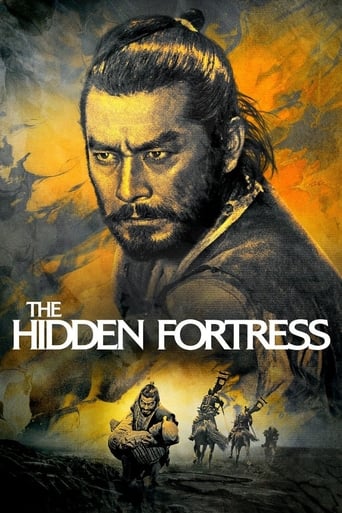



In truth, there is barely enough story here to make a film.
View Moreit is the rare 'crazy' movie that actually has something to say.
View MoreThe movie runs out of plot and jokes well before the end of a two-hour running time, long for a light comedy.
View MoreI enjoyed watching this film and would recommend other to give it a try , (as I am) but this movie, although enjoyable to watch due to the better than average acting fails to add anything new to its storyline that is all too familiar to these types of movies.
View MoreReleased in 1958, Akira Kurosawa's THE HIDDEN FORTRESS is an action-adventure in the age of the samurai. As the film opens, two buffoonish peasants, Tahei (Minoru Chiaki) and Matashichi (Kamatari Fujiwara) are heading home after failing to make a living as mercenaries. Dramatic events have happened in their region: the Yamana clan has laid waste to the lands of the Akizuki clan. Only the Akizuki princess, Yuki (Misa Uehara) and her clan's dashing general Rokurota (Toshiro Mifune) have managed to escape, hiding out in the hidden fortress of the title, but the Yamana have put out a large reward for their capture. As General Rokurota and Princess Yuki set off from their refuge for the safe territory of an allied clan, the general enlists Tahei and Matashichi to help and carry their loads. The film is richly comedic, as the peasants are oblivious to the identity of their boss and his lady, and they are continually led astray from the escape plan by their greed, but Rokurota always finds a way to make their foolishness work to his and the princess's advantage.In many respects, this is the closest of Kurosawa's films to the 1950s big-budget "Hollywood movie". It is an extravaganza shot in Cinemascope with amazing stunts on horseback, a dramatic fight scene between the hero and a village, and a riotous village dance at festival time. It is easy to see why the film was such a smash success in Japan and abroad. Don't think this is any commercial sellout, though, as THE HIDDEN FORTRESS maintains all the strengths of Kurosawa's work in this period, with believable, nuanced characterization, innovative camera techniques, and dramatic samurai clashes that show an awareness of American Westerns.The acting in particular is incredible: Toshiro Mifune shows a perfect confidence in his role and his great versatility where he could be stern and severe one moment, maniacally laughing the next. Both of the peasants are hilarious, and while Kamatari Fujiwara was long known as a comedic actor, Minoru Chiaki here shows a different side than in earlier Kurosawa films. Surprisingly, Princess Yuki is mainly in the background; her appearance on film posters or DVD boxes might lead you to expect a prominent role and maybe some daring action sequences from her (she is said to be a tomboy, after all), but mainly she plays only a supporting character serving as a social critique of Japanese rulers, and the bulk of the story plays out between Rokurota and the peasants. Misa Uehara is a seductive screen presence in the bits she has, though, and it is perhaps a loss to cinema that she retired from her brief acting career soon after.While THE HIDDEN FORTRESS is perhaps not as "deep" or psychologically intense as certain other Kurosawa films (such as THRONE OF BLOOD), this is an all-around great movie, a heck of a lot of fun for any casual view, and full of filmmaking details that cinema anoraks can chew on. I would generally recommend it to all and sundry.The obligatory George Lucas mention: Kurosawa served as a light inspiration for STAR WARS, namely showing much of the action from the viewpoint of the lowliest characters. However, except for that feature, there aren't many similarities between Kurosawa's film and that later science-fiction blockbuster; Lucas's championing of the film is a good thing inasmuch as it might bring Kurosawa to a wider audience, but it has the downside of perhaps prejudicing one's expectations.
View MoreIt's almost impossible not to like "The Hidden Fortress". It is an action-adventure-comedy with something to please just about everyone. Created by one of the greatest film directors of all time, the movie follows a diverse set of characters through a series of more cliff-hanging adventures than any movie this side of "Raiders of the Lost Arc". As the noble and loyal samurai general in disguise who leads the cast, Toshiro Mifune was in absolute top form in this film. Sharing his adventures are a plucky and willful young princess and two hilariously foolish, venal and horny peasants. Their task is to convey the princess, along with a large cache of hidden gold, through enemy lines to safety. It's not a complicated plot but, in the hands of director Akira Kurosawa, it becomes a veritable roller-coaster ride of thrills. For those who insist that they don't care for black-and- white movies, or movies with subtitles, just be assured that those issues really don't matter in this case. If you don't enjoy this, you probably won't like anything.
View MoreI think there are three great thresholds or paradigm shifts in film that have contributed much excitement to film fans, since the great masters have had to cope with the changes and try them out. The first was the advent of sound, the second the introduction of a wider aspect ratio, and the third the use of colour.All of the Kurosawas I've seen are beautiful poems. That this is Kurosawa's first film in Tohoscope, that is, in a wider aspect ratio than 4:3, is in itself an event. It would be 1970 when he would direct his first colour feature, although there's that effective use of colour in "High and Low" (1963).He is able to utilize space so well that both are thoroughly magical, and here the complete impotence of our two antiheroes is reflected in the large emptiness surrounding them, that is, loneliness in vastness, as used by Antonioni to great effect in a few year's time.I like his use of sand (and rock and boulders) in the film, especially since I'm also a big fan of Teshigahara and Imamura. They seem to have a life of their own, the rocks and boulders.And his portrayal of the violence of the mob towards the beginning of the film; the most exhilarating sequence involving stairs, far outdoing the Odessa steps as the ultimate example of not only violence and aggression but appropriation of class dynamics (it's the mutiny here that falls down from above). And the way he shoots the crowded streets and interiors, something beautiful in itself and worth looking for. And Mifune on horseback, chasing the two Yamana men, both his hands on his sword; an iconic moment that might be equally only by Nakadai's similar moment, with his bow and arrow, in "Ran" (1985). And the rain!And, and, and...
View MoreWhat a wonderful movie! In my top 5 Kurasawa movies for sure alongside Seven Samurai, Ran, Throne of Blood and Yojimbo. As always it is superbly directed, and looks amazing especially in the once again epic scenery and use of CinemaScope. The music score is suitably lively(though my favourite score of any of Kurasawa's movies is still Ran), the script is literate and amusing and the story compels. The action sequences are beautifully choreographed and exciting and the comedy puts a smile on my face. The acting is just as accomplished as ever, with Toshiro Mifune giving yet another charismatic lead performance, and Minoru Chiaki and Kamatari Fujiwara match him just as effectively. Through his camera and directorial techniques you can see Kurasawa paying debt to John Ford's western, and you can also see with the galaxy far far away idea especially the major influence it had on Star Wars. The Hidden Fortress was said as well to be Kurasawa's own personal favourite of his work, and while not quite mine(Seven Samurai) I can definitely see why, and it is perhaps his most accessible(I have often seen Throne of Blood criticised for its dramatic structure and one-dimensional characters and I know people were deterred by the length of Seven Samurai). In conclusion though, a truly great film. 10/10 Bethany Cox
View More